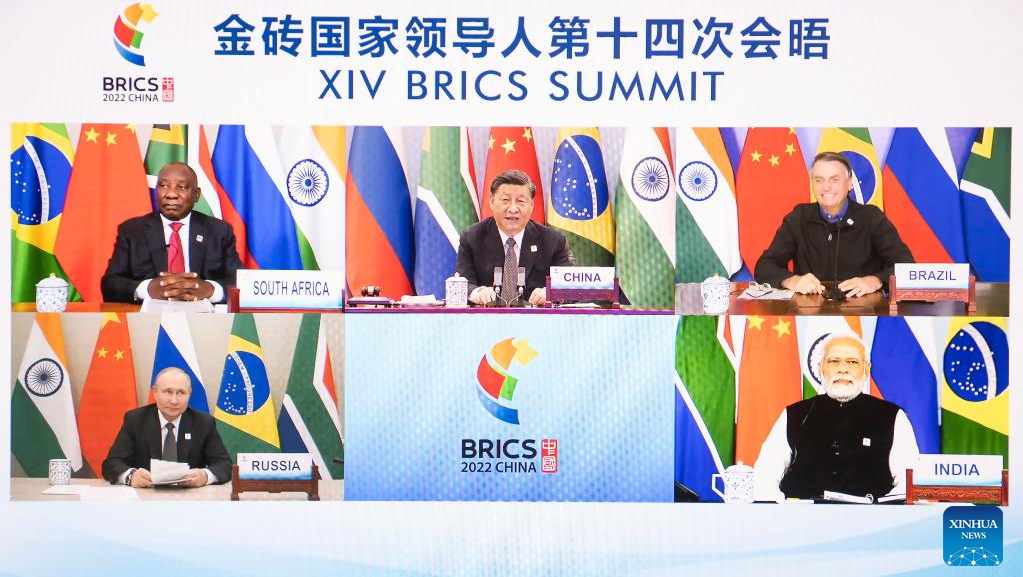The 14th summit of BRICS was held virtually by China on Thursday, June 23. At the end of the summit, the member countries jointly denounced hegemonic practices and called for the establishment of a true multilateral and democratic world order with increased participation of emerging and developing countries in global economic decision making.
The summit was attended by Russian President Vladimir Putin, Indian Prime Minister Narendra Modi, Chinese President Xi Jinping, South African President Cyril Ramaphosa, and Brazilian President Jair Bolsonaro via video conferencing. It was followed by a high-level dialogue on global development.
The joint declaration issued at the end of the summit talked about “broadening and strengthening the participation of emerging markets and developing countries (EMDCs) in the international decision making and norm setting processes.”
Multilateralism and democracy in global governance
Speaking on the eve of the summit meeting, Chinese President Xi Jingping warned against some countries trying to dominate the world and forcing others to follow their diktats by using their “primary position in the international financial and monetary system.” He denounced the use of unilateral sanctions to “politicize the global economy and turn it into one’s tool or weapon” by countries such as the US, and cautioned that such moves will “end up hurting one’s own interests as well as those of others and inflict suffering on everyone.”
During the summit address, Xi urged the BRICS members to cooperate and pool their technological know-how and economic resources in order to create an alternative to West-dominated global economic governance and “jointly meet challenges in poverty reduction, agriculture, energy, logistics and other fields.”
Despite the fact that BRICS countries represent around 25% of the world’s total GDP, 40-45% of the global population and 16% of global trade, they have been at the receiving end of the hegemonic practices employed by the US. China noted that in its attempt to dominate the world economy, the US has violated its commitments under the WTO and imposed trade restrictions on China. It has also imposed various rounds of sanctions on Russia following the latter’s attack on Ukraine, and has tried to arm twist countries like India to follow its sanction regimes.
Though the BRICS’ joint statement did not talk about sanctions on Russia and trade restrictions on China, it did ask to “avoid unilateral and protectionist measures that run counter to the spirit and rules of WTO.”
The joint statement also reiterated the need to reform the UN to make it more representative and democratic, and emphasized the need to revive the rules-based international order which is not governed by the interest of one country or bloc.
Major agenda
The BRICS summit was organized at a time when the world economy is trying to recover from the shock of COVID-19. Most of the world is also facing high inflation, causing an unprecedented rise in prices of essential commodities including food and energy. COVID-19 has also raised the serious need for cooperation in vaccine production and health service delivery. The BRICS members underlined the need of addressing these issues, claiming that the answer lies in increased south-south cooperation.
In order to share the benefits of technological advancements and to pool resources for common development, the BRICS members agreed to expand and include more countries under the format of BRICS+. In recent years, BRICS has tried to engage countries such as Argentina, Nigeria and the UAE, among others, and has plans to increase engagement in the future.
The BRICS members also agreed to work to create global regimes for public service delivery, vaccine production, COVID-19 relief and other health-related issues. The decision to take initiatives to work in the field of vaccine development for poorer countries like South Africa has become more important following the West-dominated WTO’s refusal to accede to a TRIPS waiver as demanded by over 100 developing countries.
Noting that “some countries attempt to expand military alliances to seek absolute security, stock block based confrontation by coercing other countries into picking sides, and pursue unilateral dominance at the expense of others’ rights and interests,” Xi asked BRICS members to support each other and “reject hegemony, bullying and division.” He proposed the operationalization of a Global Security Initiative (GSI) to create “a new path of security that features dialogue over confrontation, partnership over alliance and win-win over zero sum.”
BRICS countries agreed to include the UAE, Bangladesh, Egypt and Uruguay as new members of the Shanghai-based New Development Bank, and also to open its branch in India. The bank will provide easy loans to developing countries under the Contingent Reserve Arrangement. The BRICS members also agreed to strengthen alternatives to the SWIFT banking system to end the hegemony of the West.





